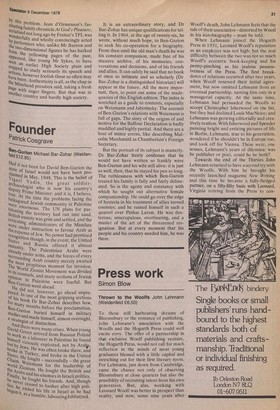Pounder
Patrick Cosg rave
Ben-Gurion Michael Bar-Zohar (Weidenfold £12.95) Had it not been for David Ben-Gurion the state of Israel would not have been proclaimed in May, 1948. This is the belief of igael Yadin, thegreat soldierarchaeologist who is now his country's deputy Prime Minister: and it is, I believe, tjue. At the time the problems facing the uelengured Jewish community in Palestine Were enormous. The UN plans for partitioning the territory had run into sand. British enmity was grim and settled, and the retreating administrators of the Mandate Were under instruction to favour Arab at the expense of Jew. No power had promised 1.ecogni1i00 though, in the event, the United States and Russia offered it almost inst , y andY. The Palestinian Arabs were already uing nd every er arms, and the forces of eve surroundArab country merely awaited Tthe most propitious moment for invasion. he World Zionist Movement was divided In its counsels, and many sections of Jewish ?Pinion in Palestine were fearful. But .oen-Gurion went ahead. He did not, however, go ahead unprePared. In one of the most gripping sections of his book Dr Bar-Zohar describes how, ,ser many months before the proclamation, tsen-Gurion buried himself in military studies and made himself, almost overnight, a strategist of distinction. rs And there were many crises. When young .David Gruen arrived from Russian Poland .LO work as a labourer in Palestine he found .nirnself viciously exploited, not by Aralis, bbutbyJews' sroke He was often broke there, and in Turkey, and broke in the United Cthates. He fought — successfully — the great wWeizmann for the leadership of orld He fought the British and Arabs and his enemies in Israeli politics. inallY, he fought his friends. And, though ta!e never ceased to hanker after high politics, he ended his life in Israel as he had egurt it, as a humble, labouring kibbutznik. It is an extraordinary story, and Dr Bar-Zohar has unique qualifications for tel ling it. In 1964, at the age of twenty-six, he wrote, without much hope, to Ben-Gurion to seek his co-operation for a biography.
From then until the old man's death he was his constant companion, made free of his massive archive, of his memories, con versations and decisions, and of his friends and allies. It can safely be said that no book at once so intimate and so scholarly (Dr Bar-Zohar is a distinguished historian) will appear in the future. All the more impor tant, then, to point out some of the inade quacies of this English edition. The index is wretched as a guide to contents, especially on Weizmann and Jabotinsky. The account of Ben-Gurion's relations with Weizmann is full of gaps. The story of the origins of and motive for the Balfour Declaration is badly muddled and highly partial. And there are a host of minor errors, like describing Malcolm Macdonald as Chamberlain's Foreign Secretary.
But the portrait of its subject is masterly. Dr Bar-Zohar freely confesses that he would not have written so frankly were Ben-Gurion and his wife still alive: it is just as well, then, that he stayed his pen so long.
The ruthlessness with which Ben-Gurion treated his family is fully and fairly delineated. So is the agony and constancy with which he sought out alternative female companionship. He could go over the edge of hysteria in his treatment of allies turned enemies; and he ruined himself in such a quarrel over Pinhas Lavon. He was dexterous, unscrupulous, overbeariffg, and a master of the art of the threatened resignation. But at every moment that his people and his country needed him, he was there. Woolfs death, John Lehmann feels that the tale of their association —distorted by Woolf in his autobiography — must be told. When Lehmann joined the Hogarth Press in 1931, Leonard Woolfs reputation as an employer was not high; but the real difficulty between the two was not so much Woolfs eccentric book-keeping and his penny-pinching as his jealous possessiveness of the Press. The first breakdown of relations occurred after two years, when Woolf renewed their initial agreement, but now omitted Lehmann from an eventual partnership, naming him only in a managerial capacity. At the same time, Lehmann had persuaded the Woolfs to accept Christopher Isherwood on the list, but they had declined Louis MacNeice; and Lehmann was growing editorially and creatively restless. With Isherwood and Spender painting bright and enticing pictures of life in Berlin, Lehmann, true to his generation, wondered if he shouldn't be in Europe too, and took off for Vienna. These were, one senses, Lehmann's years of dilemma: was he publisher or poet, could he be both?
Towards the end of the Thirties John Lehmann returned to have a second try with the Woolfs. With him he brought his recently launched magazine New Writing and this time he became a fully-fledged partner, on a fifty-fifty basis with Leonard, Virginia retiring from the Press to con














































 Previous page
Previous page